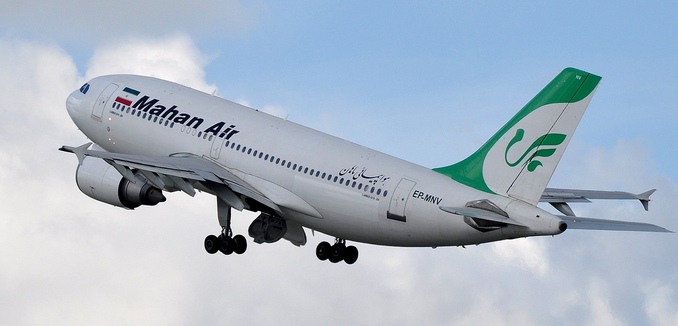The United States’ failure to ground a sanctioned Iranian airline that provides logistical support to the Islamic Revolutionary Guard Corps (IRGC) in Syria underscores a severe loss of American credibility, which the Obama administration should immediately act to restore by penalizing companies and financial institutions that allow the airline to operate, Emanuele Ottolenghi, senior fellow at the Foundation for Defense of Democracies, wrote in an op-ed (Google link) published Wednesday in The Wall Street Journal.
Ottolenghi observed that although the U.S. government “has repeatedly committed itself to grounding” Mahan Air, which the IRGC uses to transport troops and weapons to support the regime of Bashar al-Assad, the airline continues to fly and is in fact expanding its international routes. He added that Mahan is the most “significant” Iranian entity remaining under American sanctions, explaining:
The U.S. Treasury sanctioned it in October 2011 for “providing financial, material and technological support to the Islamic Revolutionary Guard Corps-Qods Force (IRGC-QF)” and for providing transportation services to Iran’s Lebanese terror proxy, Hezbollah. In October 2012, Treasury blacklisted 117 Iranian commercial planes, including all of Mahan’s aircraft, because “Iran used Iran Air and Mahan Air flights between Tehran and Damascus to send military and crowd control equipment to the Syrian regime.”
The Islamic Republic continued to rely on civilian aircraft to supply the Assad regime throughout the talks leading to last year’s nuclear deal. A Western intelligence report leaked to Reuters in 2012 confirmed that Mahan was at the center of the IRGC airlift to the Assad regime. So has a United Nations panel in charge of monitoring implementation of international sanctions against Iran.
Treasury in 2012 raised concerns about Mahan violations of civil-aviation rules, including the use of “a combination of passenger and cargo flights and declaring illicit cargo as humanitarian and other licit goods.” Nearly five years into Syria’s civil war, Mahan continues to offer the IRGC steady logistical support. In late July, Qods Force commander Qasem Soleimani flew to Moscow to enlist Russian support for a counteroffensive to salvage the Syrian regime’s corridor from the capital, Damascus, to Latakia and Tartous, the two Mediterranean port cities housing Moscow’s naval bases.
After Soleimani’s trip to Moscow, Mahan’s flights to Syria increased in order to support the Assad regime’s offensive against rebel factions, which began in October.
Ottolenghi wrote that shortly after the nuclear deal with Iran was signed, Acting Under Secretary of Treasury for Terrorism and Financial Intelligence Adam Szubin warned that “a foreign bank that conducts or facilitates a significant financial transaction with Iran’s Mahan Air . . . will risk losing its access to the U.S. financial system.” However, the Obama administration did not take any substantive action to restrict Mahan’s movements and, on the contrary, agreed to cancel Interpol red notices against Mahan’s chief executive and a senior manager as part of a deal to free five American hostages from Iran.
The Obama administration needs to enforce existing sanctions against Mahan, Ottolenghi concluded, adding that it can do this by taking action against any financial institution that helps finance Mahan and impose fines on companies that provide ground-services to the airline. Only then will there be any chance of forcing Mahan to cut back on its operations.
Ottolenghi frequently highlights Mahan flights, especially those to Syria, in his Twitter feed.
He also documented the Obama administration’s lack of resolve in confronting Mahan in The Central Pillar Supporting the Iran Deal Has a Big Crack In It, which was published in the July 2015 issue of The Tower Magazine.
The recent transfer of nine used Airbus aircraft to U.S.-sanctioned Mahan Air is a good example of the administration’s credibility gap. On May 8, 2015, Mahan took delivery of eight Airbus A340-642s and one Airbus A321. The eight larger planes, all ferried from Iraq to Iran under cover of night, were bought in Europe through Al-Naser Airlines, an Iraqi intermediary that acted on Mahan’s behalf in violation of U.S. sanctions that prohibit the sale of aircraft to Iranian airlines.
That this happened under the nose of U.S. negotiators was telling enough. But to make matters worse, Reuters revealed that “the acquisition violated international sanctions and went ahead despite a tip-off from Israel.” Aviation chat rooms, moreover, appear to have taken it for granted that Al-Naser—a small private carrier whose scheduled flights were all local and was hardly in need of the A340s range of 7,900 nautical miles—might be fronting for Mahan. And the European suppliers were large, prominent companies. If this deal was a matter of public knowledge for months, why did the administration ignore warnings from an ally and rush to close the stables only after the proverbial horses had escaped?
For an administration that claims to have absolute knowledge of Iran’s clandestine nuclear activities, this was an embarrassing incident. This is likely why, even though designations usually take months, if not years to pass every evidentiary hurdle and interagency process before they are cleared, the U.S. Treasury Department designated some—but not all—intermediaries and culprits within days.
Yet more than a month later, the U.S. has yet to name and fine the European suppliers of the eight aircraft, whose identity is easily established by a brief perusal of civil aviation registries and corporate filings. Mahan’s new aircraft have been duly designated, but this is a classic case of too little, too late—exhibit three of the Obama administration’s credibility gap.
[Photo: ERIC SALARD / Flickr ]




